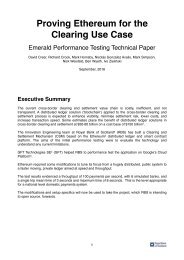Bitcoin and Cryptocurrency Technologies
1Qqc4BN
1Qqc4BN
Create successful ePaper yourself
Turn your PDF publications into a flip-book with our unique Google optimized e-Paper software.
7.2: <strong>Bitcoin</strong> Core Software<br />
<strong>Bitcoin</strong> Core is a piece of open‐source software which is a focal point for discussion <strong>and</strong> debate about<br />
<strong>Bitcoin</strong>’s rules.<br />
<strong>Bitcoin</strong> Core is licensed under the MIT license which is a very permissive open‐source license. It allows<br />
the software to be used for almost any purpose as long as the source is attributed <strong>and</strong> the MIT license<br />
is not stripped out. <strong>Bitcoin</strong> Core is the most widely used <strong>Bitcoin</strong> software <strong>and</strong> even those who don't<br />
use it tend to look to it to define what the rules are. That is, people building alternative <strong>Bitcoin</strong><br />
software typically try to mimic the rule‐defining parts of the <strong>Bitcoin</strong> Core software, the parts that<br />
check validity of transactions <strong>and</strong> blocks.<br />
<strong>Bitcoin</strong> Core is the de‐facto rulebook of <strong>Bitcoin</strong>. If you want to know what’s valid in <strong>Bitcoin</strong>, the<br />
<strong>Bitcoin</strong> Core software — or explanations of it — is where to look.<br />
<strong>Bitcoin</strong> Improvement Proposals.Anyone can contribute technical improvements via “pull requests”<br />
to <strong>Bitcoin</strong> Core, a familiar process in the world of open‐source software. For more substantial<br />
changes, especially protocol modifications, there is a process called <strong>Bitcoin</strong> Improvement Proposals or<br />
BIPs. These are formal proposals for changes to <strong>Bitcoin</strong>. Typically a BIP will include a technical<br />
specification for a proposed change as well as a rationale for it. So if you have an idea for how to<br />
improve <strong>Bitcoin</strong> by making some technical change, you're encouraged to write up one of these<br />
documents <strong>and</strong> to publish it as part of the <strong>Bitcoin</strong> Improvement Proposal series, <strong>and</strong> that will then<br />
kick off a discussion in the community about what to do. While the formal process is open to anyone,<br />
there’s a learning curve for participation like any open‐source project.<br />
BIPs are published in a numbered series. Each one has a champion, that is, an author who evangelizes<br />
in favor of it, coordinates discussion <strong>and</strong> tries to build a consensus within the community in favor of<br />
going forward with or implementing a particular proposal.<br />
What we said above applies to proposals to change the technology. There are also some BIPs that are<br />
purely informational <strong>and</strong> exist just to tell people things that they might not otherwise know, to<br />
st<strong>and</strong>ardize some part of the protocol previously only specified in source code, or that are process<br />
oriented, that talk about how things should be decided in the <strong>Bitcoin</strong> community.<br />
In summary, <strong>Bitcoin</strong> has a rulebook as well as a process for proposing, specifying, <strong>and</strong> discussing rule<br />
changes, namely BIPs.<br />
<strong>Bitcoin</strong> Core developers.To underst<strong>and</strong> the role of the <strong>Bitcoin</strong> Core software we also have to<br />
underst<strong>and</strong> the role of <strong>Bitcoin</strong> Core developers. The original code was written by Satoshi Nakamoto,<br />
who we’ll return to later in the chapter. Nakamoto is no longer active, but instead there are a group<br />
196









